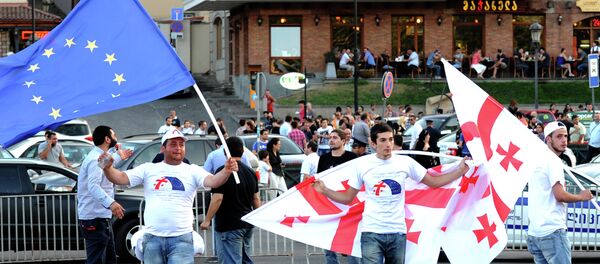Citing Western countries' refusal to expand the EU and NATO further into the post-Soviet space, Birnbaum warned that this has resulted in Russia stepping "into the vacuum, increasing its presence by opening Georgian-language outlets of its state-owned news networks and deepening investments in the energy industry and other key sectors." The columnist cites the recent opening of the Georgian edition of Russia's Sputnik news agency, and notes that trade relations have spiked since Russia's decision to lift its ban on Georgian wine imports in 2013.
What Birnbaum's narrative doesn't mention is that the expansion of Russia's communications and economic ties with the Caucasian country is not really anything exceptional, factually serving merely as a normalization of ties which go back literally hundreds of years. In the 18th century, the leading Georgian kingdom sought Russian help against the encroachment of the Ottoman and Persian empires, with the Orthodox Christian nation becoming a Russian protectorate in 1783. Since then, Georgia's leaders, intellectuals, and scientists, along with the Caucasian nation's culture, customs, music and food have been given a place of prominence in Russia's political, economic, and socio-cultural milieu, from the Czarist period, to the Soviet period and into the present.
The journalist laments that despite the present Georgian government's continued vows of its "unshakable" commitment to NATO and EU membership, Brussels' squabbling "about whether to offer even the faintest prospects for membership" to the country, together with its decision to delay "plans to ease visa rules for Georgian travelers" have come as "a bitter disappointment" for the country's leaders.
The journalist notes that Georgia's leadership has demonstrated its commitment to integration with the West in both word and deed, including via the deployment of a military contingent to Afghanistan to assist the NATO mission there, Birnbaum notes that "some Georgians [now] feel that they have little to show for their long westward push. Some of those sacrifices have been made in blood in grueling deployments to Afghanistan, where they have been one of the top contributors of soldiers to the battle efforts per capita."
Birnbaum's article also cites polling by the US-funded National Democratic Institute, whose polling between March and April found that 49 percent of respondents continue to believe that Georgia would benefit from joining the EU and NATO. Meanwhile, 31 percent of respondents now voice support for their country's integration into the EEU, 27 percent remaining uncertain. This compares with 59 percent support for the EU and 20 percent support for the EEU in August 2014.
The journalist explains that Georgian society's gradual shift away from support for Western integration has been influenced by events leading up to the ouster of disgraced former President Mikheil Saakashvili, "the Western-trained lawyer who ruled the country for a decade starting in 2003." Birnbaum hints at the dreadful consequences of Saakashvili's attack on the breakaway autonomous republics of Abkhazia and South Ossetia in 2008, which led to a Russian response, the decimation of the Georgian army and resulting in 20 percent of the country's territory formally breaking off and becoming independent states.




